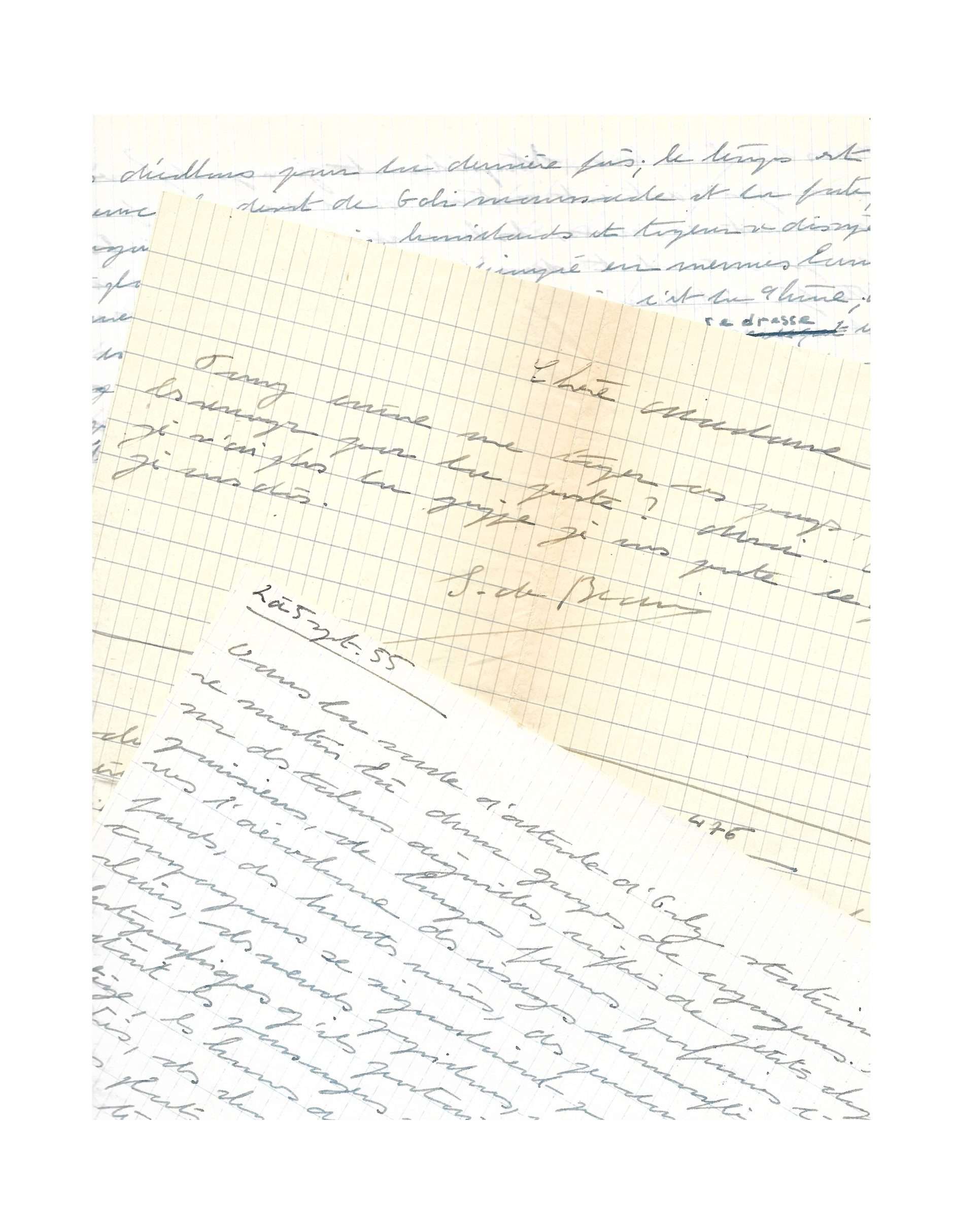BEAUVOIR (de), Simone (1908-1986)
Autograph manuscript (fragments) accompanied by an autograph letter signed for La Longue Marche – Essai sur la Chine
[Paris, 1956] 15 pages in-4°, with two autograph envelopes
« China is not a political entity; I guess with joy, that it has a sky, its colors, its trees, a flesh »
Fact sheet
BEAUVOIR (de), Simone (1908-1986)
Autograph manuscript (fragments) accompanied by an autograph letter signed addressed to hes typist for La Longue Marche – Essai sur la Chine
[Paris, 1956] 15 pages in-4°, with two autograph envelopes
Usual fold marks
Some of the last remaining folios for her essay La Longue Marche – Essai sur la Chine, an account of the official trip she made with Jean-Paul Sartre to China, from September 6 to October 6, 1955
There are three parts in these manuscript fragments:
The first fragment bears in the lead: “2 to 5 September 55”, and is paginated 25 to 30 (with a bis). It corresponds to the “Preliminaries” and opens with observations of travelers in the waiting room of Orly Airport, well dressed, taking off for Boston, contrasting with other travelers, soberly dressed, who will fly on an “official expedition” to Moscow…
Simone de Beauvoir takes notes on the Soviets, Hungarians and Czechs at Moscow airfield, and on a South African, also an official guest of the Chinese government with whom the couple of philosophers speaks. This travelogue is enriched with glimpses of the landscape, recalling the Western presence in Mongolia since the seventeenth century (scholars, monks, adventurers, etc.):
« Comme Paris est loin ! Derrière moi le temps et l’espace se sont si bien embrouillés, le système de nos besoins – faim, soif, sommeil – et de toute ma vie a été si radicalement lissé qu’il me semble non avoir fait un voyage mais terminé un rite de passage, long, fatigant, et qui m’a jetée insensiblement ailleurs. J’écoute l’aimable discours qu’on nous adresse en chinois et qu’un interprète traduit. Les porteurs de hautes fleurs écarlates, la moiteur de l’air, la forte odeur végétale qui monte de la terre me suffoque. […] Jusqu’ici quand je pensais à la Chine, je pensais à une histoire, une civilisation, un régime […] mais la Chine n’est pas
une entité politique ; je devine avec joie, qu’elle a un ciel, ses couleurs, ses arbres, une chair »
On December 16, 1956, she sent a second fragment paginated 476, 486 bis. It corresponds to Chapter V, “Culture”:
« Sous les Mandchous, la décadence du monde féodal se réflète dans la littérature ; elle commença à s’évader des règles formelles ; des genres nouveaux se développèrent. Le roman devint autre chose qu’un divertissement […] Le Rêve de la chambre rouge entre autres est caractéristique de cette période »
On December 18, 1956, she sent a last fragment paginated 757, 781 and 782. It corresponds to Chapter VIII “Cities of China”:
« Elle fut la capitale des Song dont le règne coïncida avec le plus beau moment de la civilisation chinoise, et on la considère comme l’Athènes de la Chine. […] Les maisons ne ressemblent pas à celles de Pékin. Au lieu de se cacher derrière des murs, elles exhibent des façades de deux à trois étages, garnies de fenêtres »
In September-October 1955, Simone de Beauvoir was an official guest of the Chinese government, like many other European writers. She goes there with Sartre. On her return, she wishes to tell her experience in this country that has just completed its revolution. The essay was published by Gallimard in April 1957. The manuscript, on the other hand, has disappeared. These are the last remaining sheets of the work. The envelopes confirm unsurprisingly that she was working on this essay in 1956. Sylvie Le Bon de Beauvoir, the writer’s adopted daughter, notes that the set belongs to a version prior to the last draft, because her mother deleted almost all the sheets numbered from 25 to 30, profoundly modifying her “Preliminaries”.
